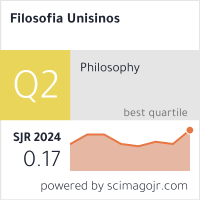Saul Kripke’s naturalized metaphysics
Resumen
This article starts with an examination of Saul Kripke’s views of the semantics of modal logic and concludes by pointing to some epistemological and ontological consequences of those views that seem to be incompatible with the way empirical science in fact works and progresses. In dealing with the problem of identifying the same objects in different possible worlds, Kripke is led to develop his original positions on topics such as the theses of the fixation of the reference independent of meaning (where he disagrees with Frege) and the noncoincidence between necessary and a priori truths (where he disagrees with Kant). In Kripke’s view, it is a particular type of knowledge – scientific knowledge – that determines what should be considered as essential or necessary. And the statements that represent these a posteriori scientific discoveries “are not,” in his words, “contingent truths, but truths that are necessary in the strictest possible sense.” Thus, in Kripke’s view, our (scientific) knowledge determines without distortion the essential properties of what is real, which turns his ontology into a direct function of the discoveries of empirical science. This “naturalization of ontology”, as shown in the conclusion of this article, is not compatible with recognition of the defeasibility of our semantic or scientific criteria and overloads scientific the endeavor with a metaphysical burden which science itself does not claim and is not capable of carrying.
Key words: fixation of reference, a posteriori necessity, naturalized ontology.Descargas
Métricas
Descargas
Publicado
Cómo citar
Número
Sección
Licencia
Concedo a revista Filosofia Unisinos – Unisinos Journal of Philosophy o direito de primeira publicação da versão revisada do meu artigo, licenciado sob a Licença Creative Commons Attribution 4.0 (que permite o compartilhamento do trabalho com reconhecimento da autoria e publicação inicial nesta revista).
Afirmo ainda que meu artigo não está sendo submetido a outra publicação e não foi publicado na íntegra em outro periódico e assumo total responsabilidade por sua originalidade, podendo incidir sobre mim eventuais encargos decorrentes de reivindicação, por parte de terceiros, em relação à autoria do mesmo.










